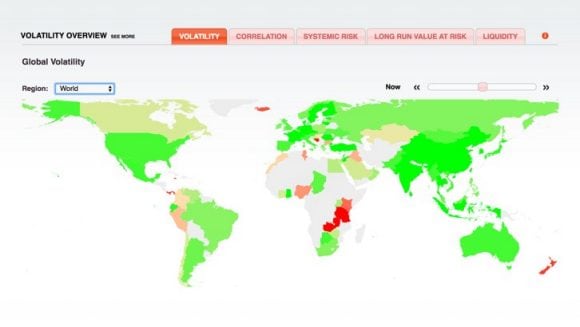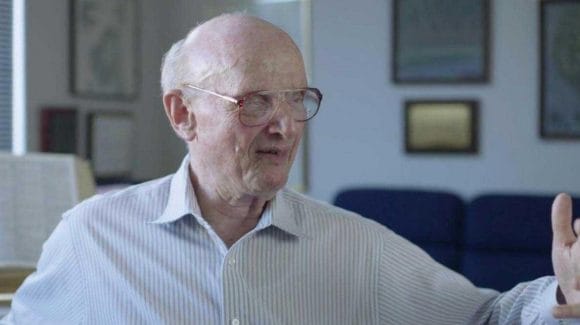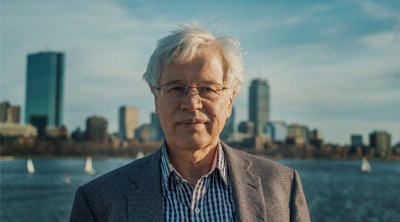The ‘premiere econometrician in the world’ is how Robert Engle’s colleagues describe him. Throughout his 48-year career he’s developed successful models to measure and predict economic events like financial crises. His masterpiece, the ARCH-Model, was developed in the 1980s and is still used today as a kind of early financial warning system. Besides his accomplishments in economics, Engle is also a dab hand at time management, because despite having a crammed calendar, he’s also managed to reach the peak of success as a semi-professional ice-skater.

Robert F. Engle III
Robert F. Engle III
The Sveriges Riksbank Prize in Economic Sciences in Memory of Alfred Nobel, 2003
At a glance
At a glance
Born: 1942, Syracuse, New York, USA
Field: Econometrics
Prize-winning work: Methods of analyzing economic time series with time-varying volatility (ARCH)
Addictions: Espresso
Wasted chances: Research area of his final paper in physics was awarded the Nobel Prize in the same year he received it in economics
Ice-skating trophies: "Too many to count them"
A man of many talents
A man of many talents
You might just as easily find him sleeping in a tent or a five star hotel, ice-skating in snowy New York or canoeing in sunny California. So it’s no surprise that his biography reads like one long adventure, accompanied by a healthy dose of self-deprecation. Maybe this is why, despite his never-ending string of successes, you can’t help but like Robert Fry Engle III. His family and friends know him as a true companion, a well-oiled machine, a focused economist and beloved family man. And as he opens the door of his apartment close to Washington Square Park, one of those typical Manhattan buildings, the Nobel Laureate introduces himself with a firm handshake, welcomes us in, and tells us where it all began.
When Engle was growing up, his father built a workshop where he taught his eldest son about science. When he wasn’t playing in a variety of sports teams or practicing the tuba, cello and bass, he was doing scientific experiments.
Even while studying under Nobel Laureate Hans Bethe, he knew that physics wasn’t going to be his future. So after finishing his master’s degree, Engle started taking courses in the soft science of economics.
Using economics to answer the most important questions
Using economics to answer the most important questions
Engle’s scientific study was vital for his economic research, particularly in the field of econometrics, which uses mathematical and statistical analysis to forecast trends, and which Engle helped pioneer.
He’s developed models that not only serve academics but investors, companies and regulators too. Widely used to foresee volatility and risk in financial markets, it gives answers to the most common questions. What is the tradeoff between risk and return? How do you make money in finance without taking risk? How much risk should you take? How much do you make when you take more risk?
His most profound work, the groundbreaking ARCH-model is "everywhere in finance," Engle admits. He explains that not only has it been the basis for many other more accurate tools but it also ended up being the reason he changed his focus from macroeconomics to finance.
How the ARCH-model changed the financial sector
Can the ARCH-Model help us predict the future?
Can the ARCH-Model help us predict the future?
The full name of Engle’s model is a challenge for experts not to mention the average person who wants to invest their savings. "In fact, I have my classes practice this," he laughs. "It stands for Auto Regressive Conditional Heteroscedasticity."
"I developed this as a forecasting tool to try to figure out when risks were greatest,” he continues. “Taking each movement from one day to the next and then taking the square of them and averaging them, gives you a sense of how much they move around.”
“But that’s not a very good way of forecasting. Because it means that you think that the future movements are equally related to what happened yesterday and what happened two years ago."
The ARCH-model was only the beginning, it also told economists which sets of data turned out to be the best over a historical period. Engle went on refining the tools to make them even more accurate.
What needs to be done after a financial crisis?
What needs to be done after a financial crisis?
Of course, it’s impossible not to ask why there was a financial crisis. "Well," he starts, "Risk was very low and volatility was very low before the financial crisis, but that was a short run risk. And many people who saw this ended up buying big quantities of mortgage-backed securities and other kinds of assets, and all the things that got people into trouble because they thought risk was low. But it was only low in the short run."
How can we avoid another financial crisis?
Who was to blame for the financial crisis?
Who was to blame for the financial crisis?
Unlike some of his colleagues, Engle doesn’t blame bankers. He says they wouldn’t have taken so much risk if they’d known they were doing it. "People don’t see what the long-run risks are, they only see the short-run risks,” he says. “We call this risk myopia. If the risk is really constant at its level, that’s one thing, but if it changes from that level, it can get worse. So one interpretation of the financial crisis is that we need to do better risk management. To make better decisions, have smaller errors and avoid these kinds of events in the future."
What would a new crisis cost us?
What would a new crisis cost us?
Engle can only forecast one day into the future but his ultimate goal is to be able to forecast risk months ahead or even a whole year.
The latest ARCH-version shows how much capital any particular financial institution would need to raise in case of a new financial crisis. So how much would it cost to rescue the entire banking system in the event of another financial crisis?
"Today, that number is about $3.5 trillion," he says. This is a big number, he agrees, but insists that this number isn’t as large as it would have been in the years 2011 and 2012, when the sovereign debt crisis was going on in Europe, or as big as it was during the 2008, 2009 financial crisis. "But it’s still a big number."
Should government debt be paid back?
A life-changing prize
A life-changing prize
The Nobel Prize has given Engle opportunities to do more. The funds that came with it enabled him to found the Volatility Institute, or V-Lab, at New York University’s Stern School of Business in 2009. When his wife Marianne remembers the call from Stockholm, she still gets moved to tears.
The last words they said to him were ‘Your life will never be the same again.’ Then they hung up.
"And Rob said to me,” she continues. “’Oh my God, they said my life will never be the same, what shall I do?’ I said ‘Change your shirt!’” The story gives a touching insight into how the Engle family deals with communication outside of an academic field - with a good laugh.
At the institute and the NYU campus, Engle is all business but another side of his personality reveals itself when he’s not on the clock. Marianne, a psychologist, is still surprised whenever he steps on stage for a speech. She remembers the first time joining him at a professional event. "There were some questions from the audience and he answered in the most direct, assertive, I wouldn’t say aggressive, but you know, this-is-what-it-is kind of way,” she says. “He brings this confidence!”
"I want to make sure that every time I give a talk, it’s a good talk," says Engle. The goal of leaving people with something they didn’t know before. Back at his home office, the most important recognition is hanging on the wall right next to his desk. “This is a tree," he explains. "There is the trunk and these leaves on the tree are all of my students over many, many years, and their PhDs and the name of their thesis is on here and the year they got it." That they are now economists or professionals on Wall Street fills him with great pride and proves that whatever else he’s pursuing, economics remains his first love.
How can we make better forecasts?
How can we make better forecasts?
At the V-Lab, they run 60,000 econometric models per day. They gather in data from every market around the world to examine and prove theories and explore how volatility changes from time to time with the goal of coming up with better risk measurements. "He has a gift of taking something as complex as these models and turning them into language that anyone can understand," says Robert Capellini, the Director of V-Lab. "He doesn’t put on a show in front of a class, playing the role of Nobel Laureate. He’s always authentic and genuine."
How can we measure risk for financial institutions
Engle starts talking about a new risk, where the level of risk will change between the short-run and the long-run risk. “It sounds hard to get your mind around but if the risk is really constant at its level, that’s one thing, but if it changes from that level, it can get worse,” says Engle. “And how much worse can it get? We use things like stress tests for banks where we create a scenario and we say how would the bank do under this scenario? Would it have enough capital? You can simulate the worst cases that you might expect for a year from now.” In V-Lab, these processes are done every day and are available on its website.
Has this question inspired you?
Get the latest Nobel perspectives delivered to you.
Rob’s models have shed light on where the risks are in the world,
The man behind the success
The man behind the success
Luckily, Engle can delegate some of his work to colleagues and computers, because even a Nobel Laureate needs some down time. So how does this economists relax? He loves to escape to his lake house in Mahopac, just an hour’s drive from the city, where he can fish and unwind with his family. “Have a seat and try them,” says Marianne, telling us her husband makes the best paninis in the world. With every bite, we wonder how one of the most important economists today can be a semi-professional ice-skater and such an exciting, lovable husband and father, too.
“You just have to decide that it’s not a compromise that you want to give up,” he says. “Work hard and play hard.”
The secret of being successful
Why do countries have to find better ways to grow?
Hear Michael Spence's view on how countries can grow sustainably while having a long-lasting positive impact.
More Nobel Laureate stories
Has this question inspired you?
Get the latest Nobel Perspectives updates delivered to you.




